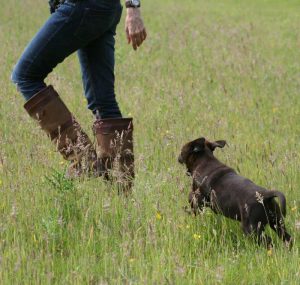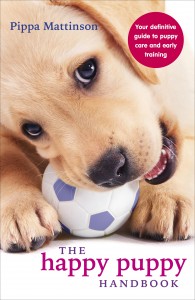Let Your Puppy Off The Lead!
Letting your puppy off the lead for the first time can be scary.
What if he runs away?
What if he won’t come back?
These are all normal worries and concerns.
Fortunately they are unfounded.
But unfortunately many new puppy owners are not aware of this.
Labrador training starts from the moment you bring your puppy home and one of the first things your dog should learn, is to follow you.
Far too many people are sold a Labrador puppy without being told of the importance of letting puppies off the lead from the very start.
Why you should let your puppy off the lead now
Small labrador puppies have a strong desire to remain very close to their ‘grown ups’ and will normally follow any adult very closely when put down on the ground.
This is a ‘safety response’ designed for their protection.
Once a puppy is over four months old, this desire to cling to your legs diminishes with every passing week.
New puppies can with a little common sense, be safely allowed to run around off the lead. They will automatically follow their owner around. At this age it is wonderfully easy to get the beginnings of a simple recall established.
By eight or nine months of age, most Labrador puppies have bucketloads of confidence and little need for your protection on a minute by minute basis. This is not a great time to let a dog off the lead for the very first time.
Towards the end of the first year of your dog’s life you should be putting the finishing touches on his off-lead recall, not just beginning to teach him how to come when he is called.
Oh dear, is it too late?
If you have made this mistake, and if your almost mature pup has never run off lead, it is not too late to begin.

You can find lot’s more information on recall training in our Recall Training Centre.
I have also written a complete recall training programme Total Recall(paid link) to help you establish a great recall with your puppy or older dog.
More help and information

Now available in most countries, the handbook is already a bestseller in the UK.
You can buy from Amazon using the links below. If you do, the labrador site will receive a small commission which is greatly appreciated and won’t affect the cost to you!

Free Labrador Updates!
Get my training tips, news, reviews, and the latest from The Labrador Site delivered to your inbox


Sadly this is not the case if you have a confident puppy.mine never stayed by me but always ran off, to another dog /food etc. she is still not good at coming back and she is 3 now . It’s very stressful, I’ve tried everything ! In every other way she is placid , gentle , sweet but walks are not easy